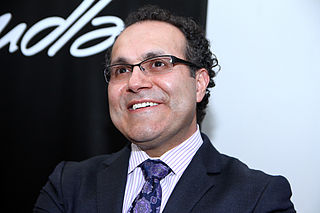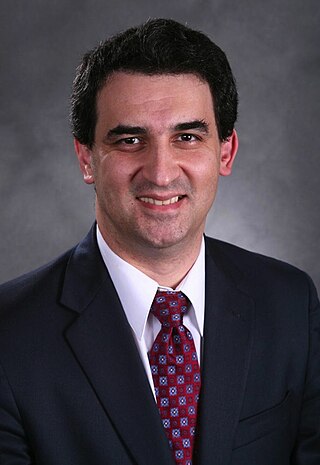Related Research Articles

Neurosurgery or neurological surgery, known in common parlance as brain surgery, is the medical specialty concerned with the surgical treatment of disorders which affect any portion of the nervous system including the brain, spinal cord and peripheral nervous system.

Radiosurgery is surgery using radiation, that is, the destruction of precisely selected areas of tissue using ionizing radiation rather than excision with a blade. Like other forms of radiation therapy, it is usually used to treat cancer. Radiosurgery was originally defined by the Swedish neurosurgeon Lars Leksell as "a single high dose fraction of radiation, stereotactically directed to an intracranial region of interest".

Stereotactic surgery is a minimally invasive form of surgical intervention that makes use of a three-dimensional coordinate system to locate small targets inside the body and to perform on them some action such as ablation, biopsy, lesion, injection, stimulation, implantation, radiosurgery (SRS), etc.
Ablative brain surgery is the surgical ablation by various methods of brain tissue to treat neurological or psychological disorders. The word "Ablation" stems from the Latin word Ablatus meaning "carried away". In most cases, however, ablative brain surgery does not involve removing brain tissue, but rather destroying tissue and leaving it in place. The lesions it causes are irreversible. There are some target nuclei for ablative surgery and deep brain stimulation. Those nuclei are the motor thalamus, the globus pallidus, and the subthalamic nucleus.

Alfredo Quiñones-Hinojosa is a Mexican-American neurosurgeon, author, and researcher. Currently, he is the William J. and Charles H. Mayo Professor and Chair of Neurologic Surgery and runs a basic science research lab at the Mayo Clinic Jacksonville in Florida.
Allan J. Hamilton is an American physician and medical consultant to ABC's medical drama Grey’s Anatomy based in Tucson, Arizona. A professor of Neurosurgery at the University of Arizona College of Medicine – Tucson, Dr. Hamilton was elected a Fellow of the American College of Surgeons in 1994. In 1995, Dr. Hamilton was promoted to Chief of Neurosurgery and became Chairman of the Department of Surgery in 1998. He currently holds a tenured professorship in Neurosurgery, as well as additional professorships in the Departments of Psychology, Radiation Oncology, and the School of Electrical and Computer Engineering. His book “The Scalpel and the Soul: Encounters with Surgery, the Supernatural, and the Healing Power of Hope” was released in March 2008. It has been translated into several languages. He is currently at work on a second book on spirituality and horsemanship, specifically on the sexual impulses of mature mares.

Philip E. Stieg is an American academic physician and neurosurgeon. He has been the Neurosurgeon-in-Chief of NewYork-Presbyterian/Weill Cornell Medical Center since 2000.
Albert Loren Rhoton Jr., was an American neurosurgeon and a professor specializing in microsurgical neuroanatomy. He developed and introduced a number of microsurgical techniques that improved the safety and effectiveness of neurosurgery, including the use of the surgical microscope in neurosurgery. He also designed many of the commonly used of microneurosurgical instruments, which bear his name. Such tools in use worldwide include the Rhoton Micro Dissectors designed for delicate work in the treatment of brain aneurysms and tumor resection.

Michael L. J. Apuzzo is an American academic neurological surgeon, the Edwin M. Todd/Trent H. Wells, Jr. Professor Emeritus of Neurological Surgery and Radiation Oncology, Biology, and Physics at the Keck School of Medicine, of the University of Southern California. He is also editor emeritus of the peer-reviewed journals World Neurosurgery and Neurosurgery. He is distinguished adjunct professor of neurosurgery at the Yale School of Medicine, distinguished professor of advanced neurosurgery and neuroscience and senior advisor, at the Neurological Institute, Wexner Medical School, The Ohio State University, and adjunct professor of neurosurgery, Weill Cornell Medicine, Department of Neurological Surgery & Weill Cornell Brain and Spine Center.

Theodore H. Schwartz is an American medical scientist, academic physician and neurosurgeon.

Alim Louis Benabid is a French-Algerian emeritus professor, neurosurgeon and member of the French Academy of Sciences, who has had a global impact in the development of deep brain stimulation (DBS) for Parkinson's disease and other movement disorders. He became emeritus professor of biophysics at the Joseph Fourier University in Grenoble in September 2007, and chairman of the board of the Edmond J. Safra Biomedical Research Center in 2009 at Clinatec, a multidisciplinary institute he co-founded in Grenoble that applies nanotechnologies to neurosciences.

James Rutka is a Canadian neurosurgeon from Toronto, Canada. Rutka served as RS McLaughlin Professor and Chair of the Department of Surgery in the Faculty of Medicine at the University of Toronto from 2011 – 2022. He subspecializes in pediatric neurosurgery at The Hospital for Sick Children (SickKids), and is a Senior Scientist in the Research Institute at SickKids. His main clinical interests include the neurosurgical treatment of children with brain tumours and epilepsy. His research interests lie in the molecular biology of human brain tumours – specifically in the determination of the mechanisms by which brain tumours grow and invade. He is the Director of the Arthur and Sonia Labatt Brain Tumour Research Centre at SickKids, and Editor-in-Chief of the Journal of Neurosurgery.
Isabelle M. Germano is a neurosurgeon and professor of neurosurgery, neurology, and oncology at the Icahn School of Medicine at Mount Sinai Hospital. She is a Fellow of the American College of Surgeons and the American Association of Neurological Surgeons. Germano works with image-guided brain and spine surgery.
N. K. Venkataramana is an Indian neurosurgeon and the founder of ANSA Research Foundation, a non profit non governmental organization promoting research on neuroscience, neurological disorders, cancer biology, stem cells and tumor tissue repository. He is a recipient of Dr. B. C. Roy Award, the highest Indian award in the medical category and the Rajyotsava Prashasti, the second highest civilian award of the Government of Karnataka.
Robert Wheeler Rand, Ph.D., J.D., M.D., was an American neurosurgeon, inventor, and Professor of Neurosurgery in the Department of Neurosurgery at the University of California Los Angeles (UCLA) from 1953 to 1989.
Subramanian Kalyanaraman is an Indian neurosurgeon and a former head of the Department of Neurosurgery at Apollo Hospitals, Chennai. He was known for his pioneering techniques in stereotactic surgery and is an elected fellow of a number of science and medical academies including the National Academy of Medical Sciences and the Indian Academy of Sciences. The Council of Scientific and Industrial Research, the apex agency of the Government of India for scientific research, awarded him the Shanti Swarup Bhatnagar Prize for Science and Technology, one of the highest Indian science awards for his contributions to Medical Sciences in 1969.
Ali Rezai is a neurosurgeon interested in the use of brain chip implants in deep brain stimulation and neuromodulation to treat Parkinson's disease, obsessive–compulsive disorder, Alzheimer's disease and traumatic brain injury.
Robert Porter was a neurosurgeon in California. Porter was a founding member of the Brain Research Institute. He became Professor of Neurological Surgery at the University of California, Irvine, College of Medicine in 1969, and was Professor Emeritus there.

Konstantin Slavin is a Professor and Head of the Department of Stereotactic and functional neurosurgery at the University of Illinois College of Medicine. He is a former president of the American Society for Stereotactic and functional neurosurgery and current vice-president of the World Society for Stereotactic and Functional Neurosurgery. His specialties include Aneurysm, Brain surgery, Brain Tumor, Cerebrovascular Disorders, Craniotomy, Dystonia, Essential Tremor, Facial Nerve Pain, Facial Pain, Glioblastoma, Headache disorders, Laminectomy, Lower back pain, Movement Disorders, Multiple Sclerosis, Neck Pain, Neurosurgery, Neurosurgical Procedures, Pain, Parkinson Disease, Spinal Cord Injuries, and Stroke.
Deborah L. Benzil is an American neurosurgeon specializing in brain and spine tumors, stereotactic radiosurgery, socioeconomic education. She was awarded the Anthony Greto Fellowship from the Association of Brain Tumor Research. She is the Vice Chair and professor of neurosurgery at the Cleveland Clinic in Cleveland, Ohio, USA.